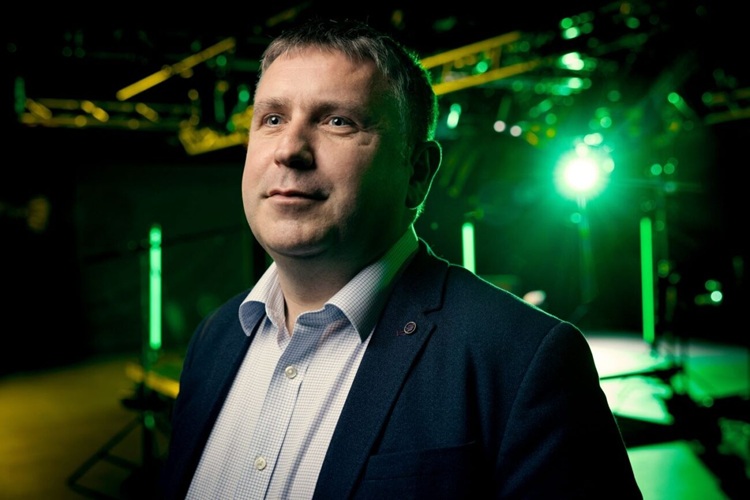Equal1 Led Quantum Computing Project Secures €13.7 million in DTIF Funding
Tuesday, 28 October, 2025
Share

- Biosimulytics another fast-growing UCD spin-out among the project partners
A quantum computing project led by (opens in a new window)Equal1, the Irish quantum computing company and a spin-out of University College Dublin (UCD), has successfully secured €13.7 million in funding under Call 7 of the Disruptive Technologies Innovation Fund (DTIF).
The QUBIC project will create quantum algorithms, hardware, and software to develop quantum-enabled solutions for Ireland’s key challenges in energy, climate modelling, advanced materials, and pharmaceuticals.
Equal1 will lead the project in collaboration with, Biosimulytics Ltd, Nexalus Ltd, Algorithmiq Computing Ltd, Dell Technologies, the Irish Manufacturing Research (IMR) Centre, UCD School of Computer Science, UCD Centre for Quantum Engineering, Science, and Technology (C-QuEST), UCD Energy Institute, and CeADAR, Ireland’s Centre for AI and the European Digital Innovation Hub for AI in Ireland.
The DTIF is a €500 million fund, established under the National Development Plan, is managed by the Department of Enterprise, Tourism and Employment with administrative support from Enterprise Ireland.
The purpose of the fund is to drive collaboration between Ireland’s world-class research base and industry as well as facilitating enterprises to compete directly for funding in support of the development and adoption of these technologies. The aim is to support investment in the development and deployment of disruptive technologies and applications on a commercial basis.
The QUBIC project was one of six projects which are receiving a total of €36.9 million in DTIF funding announced by Minister for Enterprise, Tourism and Employment, Peter Burke TD, and Minister for Further and Higher Education, Research, Innovation and Science, James Lawless TD.
Jason Lynch, CEO, Equal1 said, “Equal1 is thrilled to lead this collaboration, uniting Ireland’s most ambitious industry and research partners to push quantum from lab to impact. Together we’ll co-develop algorithms, hardware, and software aimed at real-world breakthroughs in energy, climate, materials, and pharmaceuticals.”
Biosimulytics, a UCD spin-out company headquartered at NovaUCD, provides a predictive technology platform for in-silico development of new drug molecules.
"Biosimulytics is delighted to be part of this DTIF project working together with some of the leading players in the field of quantum computing. Quantum algorithms offer incredible potential to further revolutionise the speed and success rates in developing new medicine in the pharmaceutical industry through the use of predictive technologies,” said Peter Doyle, CEO and Co-Founder, Biosimulytics.
The six funded projects span critical sectors including ICT, healthcare and advanced manufacturing reflecting the Government’s continued commitment to fostering innovation and collaboration between SMEs, multinationals, and research institutions.
Minister for Enterprise, Tourism and Employment, Peter Burke TD said, “This further €36.9 million investment in six pioneering projects under the Disruptive Technologies Innovation Fund is a clear signal of the governments continued support for bold, forward-thinking research and innovation.
These six projects demonstrate the power of disruptive technologies to solve real-world challenges, from improving patient outcomes to advancing quantum technologies, revolutionising logistics and reducing energy consumption. These projects not only drive cutting-edge R&D within industry, but also support high-value jobs and the development of transformative technologies that will improve productivity and increase competitiveness."
James Lawless TD, Minister for Further and Higher Education, Research, Innovation and Science added, "The Disruptive Technologies Innovation Fund is playing a pivotal role in advancing the knowledge economy by fostering transformative collaborations between academia and industry. This funding is empowering companies and research institutions nationwide to attract top-tier graduates to work on cutting-edge technologies. It’s also creating a vibrant pipeline of opportunities for research graduates, whether through direct employment or the development of spin-out ventures."
Jenny Melia, CEO, Enterprise Ireland, said, “The latest tranche of DTIF funding is an important solution for Enterprise Ireland clients in supporting them to transform and underpin their ability to scale, extend their global reach and create high quality jobs. It is exciting to see high potential start-ups (HPSUs) leading the development of disruptive technologies in areas such as transport logistics and quantum computing and collaborating with established multinational companies and research institutions.”
Earlier this year Equal1 unveiled Bell-1, the first quantum system purpose-built for the HPC (high performance computing) era. Bell-1 is built using Equal1’s silicon-based quantum technology, featuring a 6-qubit quantum processing system with control electronics all housed within a single rack.
Bell-1 cools its silicon quantum processor to 0.3 Kelvin, one of the coldest temperatures in the known universe, all while running in the heat, noise, and chaos of a high-performance computing (HPC) data centre packed with tens of thousands of power-hungry CPUs and GPUs.
Equal1, with offices at NexusUCD in Dublin, and in US, Canada, Romania, and the Netherlands, currently employs 45 people.
Equal1 investors include, Atlantic Bridge, Enterprise Ireland, European Innovation Council, Matterwave Ventures and 808 Ventures.
Information on the five other DTIF-funded projects is available via: (opens in a new window)https://enterprise.gov.ie/en/news-and-events/department-news/2025/october/24102025.html
ENDS
28 October 2025
For further information contact Micéal Whelan, Communications and Media Relations Manager, UCD Research and Innovation, NovaUCD, e: (opens in a new window)miceal.whelan@ucd.ie.
Editors Notes
DTIF Call 7 applications are assessed by panels of international experts against four criteria, quality of the disruptive technology, excellence of overall approach, economic impact and sustainability, and strength of the collaboration. Prospective applicants can obtain detailed information on the Fund and on the application process through (opens in a new window)enterprise.gov.ie/DTIF.